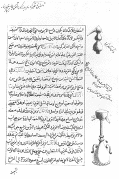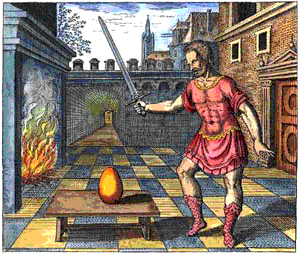Islamic Alchemical History
 The Arabians developed an interest in alchemy after they captured Egypt. Many scholars found it odd that a people as seemingly barbaric as the Arabians would capture a country, and then take a science such as alchemy and expand on the current knowledge. This is exactly what they did.
The Arabians developed an interest in alchemy after they captured Egypt. Many scholars found it odd that a people as seemingly barbaric as the Arabians would capture a country, and then take a science such as alchemy and expand on the current knowledge. This is exactly what they did.
Geber was an important Arabian whose life we know little about (see note to reader on my Philosophers page to see why that is). While many texts spell his name differently, I chose this spelling. Geber was held in highest regard by his contemporary alchemists. He wrote many books on alchemy. His books became so famous they were translated into Latin so they could be read by scholars in Europe. Some of his books were: Summa Perfectionis Magisterii; De Investigatione Perfectionis Metallorum; De Investigatione Veritatis; and Testamentum Geberi.
Geber was responsible for the first detailed writings of alchemical apparatus. This apparatus turned out to be extremely beneficial to modern scientists. The apparatus was very similar to that used today for sublimation, filtration, crystallization, and distillation. Geber's writings allowed us to imagine the alchemical labs of his time. Modern scientists and science historians have Geber to thank for his vivid descriptions of alchemical processes, equipment, and laboratory conditions.
 Geber's writings were excellent, but his explanations of how things happened left something to be desired. Gerber spent much time trying to develop a philosopher's stone. This philosopher's stone, or egg, it was said, could only be broken by a fiery sword. It was Geber's belief that metals were mainly composed of a mixture of sulphur and mercury. The pure metals contained more mercury than sulphur, and vice versa. Based upon this idea, Gerber believed it was possible to transmute copper to gold by taking the sulphur out of the copper. He thought this would leave a pure substance, or gold.
Geber's writings were excellent, but his explanations of how things happened left something to be desired. Gerber spent much time trying to develop a philosopher's stone. This philosopher's stone, or egg, it was said, could only be broken by a fiery sword. It was Geber's belief that metals were mainly composed of a mixture of sulphur and mercury. The pure metals contained more mercury than sulphur, and vice versa. Based upon this idea, Gerber believed it was possible to transmute copper to gold by taking the sulphur out of the copper. He thought this would leave a pure substance, or gold.
The downfall of Arabian alchemy happened when all of Geber's contemporaries felt his theory of sulphur and mercury was true. They did not test his hypothesis because they thought it was obvious. Many years were then wasted trying to produce gold based upon a fallacious hypothesis. Thus ended alchemy in Arabia.
Much of the research for this page was taken from the book A History of Chemistry by Ernst Von Meyer, Arno Press, N.Y. © 1975.
The image of a man with a sword was taken from http://www.levity.com/alchemy and edited by Me to add the motion of the sword.
 The Arabians developed an interest in alchemy after they captured Egypt. Many scholars found it odd that a people as seemingly barbaric as the Arabians would capture a country, and then take a science such as alchemy and expand on the current knowledge. This is exactly what they did.
The Arabians developed an interest in alchemy after they captured Egypt. Many scholars found it odd that a people as seemingly barbaric as the Arabians would capture a country, and then take a science such as alchemy and expand on the current knowledge. This is exactly what they did. 